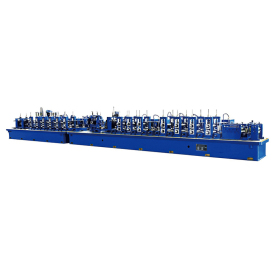
Revolutionizing Manufacturing: The Role of Tube Making Machines in Modern Industry and Their Impact on Production Efficiency
In today’s fast-paced manufacturing landscape, efficiency, precision, and consistency are paramount. One of the critical components that play an indispensable role in achieving these objectives is the tube making machine. These machines are designed to produce a variety of tubular products used across numerous sectors, including construction, automotive, aerospace, and consumer goods. This article delves into the workings of tube making machines, the types available, their applications, and their significance in enhancing production efficiency.
Understanding Tube Making Machines
Tube making machines are sophisticated pieces of equipment that transform raw materials, typically in the form of metal strips or coils, into finished tubular products. The process typically involves several stages, including welding (for longitudinally welded tubes), shaping, cutting, and sometimes finishing operations like polishing or coating. Depending on the design and technology of the machine, these processes can occur in a seamless flow, allowing for high throughput and minimal waste.

Revolutionizing Manufacturing: The Role of Tube Making Machines in Modern Industry and Their Impact on Production Efficiency
Types of Tube Making Machines
There are several different types of tube making machines, each tailored for specific applications and materials:
1. **Seamless Tube Machines**: These machines produce tubes without any seams, making them ideal for high-pressure applications found in industries like oil and gas. The manufacturing process often involves rotary piercing and elongation.
2. **Welded Tube Machines**: These machines create tubes by welding together metal strips. They are versatile and can produce various sizes and shapes of tubes. Their efficiency has made them popular in creating structural components and other applications requiring medium strength.
3. **Thin-Walled Tube Machines**: Designed to produce lightweight, thinner tubes, these machines cater to industries where weight reduction is crucial, such as in automotive and aerospace applications.
4. **Specialized Tube Making Machines**: Besides the traditional tube production, there are machines specialized for unique requirements, such as producing tubes with varying wall thicknesses, shapes, or internal features.
Applications of Tube Making Machines
Tube making machines cater to a wide range of industries, showcasing their versatility and importance:
– **Automotive Industry**: Tubes are essential for various components, including exhaust systems, fuel lines, and structural elements. Efficient and precise tube making directly impacts the performance and safety of vehicles.
– **Construction Sector**: Tubes are extensively used in scaffolding, plumbing, and structural frameworks. Robust tube making machines ensure that these products meet the rigorous standards of durability and strength.
– **Aerospace and Defense**: High-quality tubes manufactured using advanced tube making machines are crucial for aircraft structures, fuel lines, and hydraulic systems, where safety is non-negotiable.
– **Consumer Goods**: From furniture to appliances, tubes play a significant role in the design and functionality of various consumer products, making reliable tube production vital for manufacturers.
The Impact on Production Efficiency
One of the most significant benefits of modern tube making machines is their impact on production efficiency. Traditional methods of tube manufacturing often involve manual labor and slower, less precise processes, leading to higher overhead costs and longer lead times. In contrast, automated tube making machines streamline production by integrating advanced technologies like robotics, computer numerical control (CNC), and real-time monitoring systems.

Revolutionizing Manufacturing: The Role of Tube Making Machines in Modern Industry and Their Impact on Production Efficiency
1. **Increased Throughput**: Modern tube making machines can operate at high speeds with consistent quality. This means manufacturers can meet growing demand without sacrificing product integrity.
2. **Reduced Waste**: State-of-the-art tube making machinery minimizes scrap through precise material handling and accurate production processes. The reduction in waste not only decreases material costs but also promotes sustainable manufacturing practices.
3. **Customization Options**: Advanced tube making machines allow for easy reconfiguration to produce different tube sizes and shapes, enabling manufacturers to respond swiftly to changing market demands without significant downtime.
4. **Enhanced Quality Control**: With integrated monitoring systems, manufacturers can ensure consistent product quality throughout the production run, reducing the likelihood of defects and enhancing customer satisfaction.
Conclusion
Tube making machines play a crucial role in modern manufacturing, revolutionizing how industries produce tubular components. Their ability to enhance production efficiency, reduce waste, and maintain high standards of quality makes them an invaluable asset across various sectors. As technology continues to advance, the capabilities of tube making machines will likely expand, further solidifying their importance in the global manufacturing ecosystem. Companies that invest in high-quality tube making machines will not only improve their production processes but also gain a competitive edge in the evolving marketplace.Industrial All-in-one High Frequency Welder
